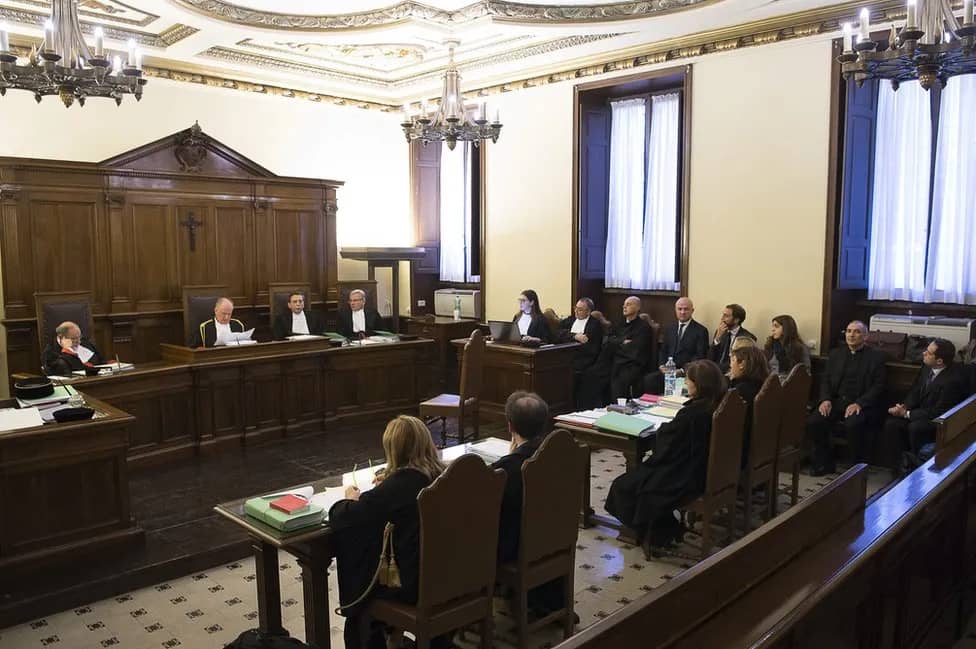[Note by Austen Ivereigh: Father Antonio Spadaro SJ, editor of La Civiltà Cattolica and one of the Jesuits closest to Pope Francis, recently got in touch with me to ask if he could clear up misunderstandings over a tweet of his which had caused offense in some quarters. The tweet was in response to a barrage of ill-tempered criticism he had received for defending Pope Francis’s exhortation on the family, Amoris Laetitia.
I suggested that, as well as clarifying the tweet, he could use the opportunity to respond more fully to the so-called ‘dubia’ letter recently made public by four cardinals who wrote it. He kindly agreed, on the understanding that we make clear that he was not responding on behalf of anybody but himself. The interview was conducted by email.]
You recently asked for, and got, an apology and correction from a newspaper columnist after he claimed you had insulted the four cardinals who wrote to the pope asking for clarification of Amoris Laetitia. Others have repeated the allegation, which has taken wing on social media. Do you want to first of all clear this up?
The whole thing is ridiculous. And deeply offensive, that anyone should believe that I could ever refer to a cardinal as a ‘worm’. I might not agree, or make a light-hearted joke, but offense is something else together.

What happened was the exact opposite of what is claimed. I tweeted that Amoris Laetitia was an act of the magisterium. Someone quoted my tweet and compared both Pope Francis and myself to Tolkein’s characters Grima the Wormtongue and Saruman. In a light-hearted, ironic riposte, I simply posted a screenshot from the Lord of the Rings movie without any comment, in which Saruman says, ‘to bandy crooked words with a witless worm’. The reference was to myself, not to anyone else.
So what was the source of the misunderstanding?
I have no idea. Someone decided I was insulting the four cardinals who wrote the ‘dubia’ letter, and this idea took off and went viral. How anyone decided I was referring to the cardinals is a mystery — ask those who tweeted it!
When I realized what was happening I deleted the tweet, which was being used in ways that were unseemly by people who present themselves as defenders of Catholic orthodoxy. Then the fact that I deleted it was used as proof that I now regretted insulting the cardinals. Sadly, the manipulation continues.
How does that make you feel?
 I dislike the fact that some groups resort to such tactics simply in order to be heard. Ross Douthat, the New York Times columnist, repeated the claim but when I pointed out the mistake he apologized and corrected his article, which was very honest of him. Sadly, that’s not true of First Things, which doesn’t come out of this looking so good. Every newspaper or magazine is responsible for its own quality standards.
I dislike the fact that some groups resort to such tactics simply in order to be heard. Ross Douthat, the New York Times columnist, repeated the claim but when I pointed out the mistake he apologized and corrected his article, which was very honest of him. Sadly, that’s not true of First Things, which doesn’t come out of this looking so good. Every newspaper or magazine is responsible for its own quality standards.
There’s also the issue of a Twitter account which some of your critics claim you are ‘hiding’ behind.
What do they mean, “hide”?! The account was simply an under-used one of three or four I operate, including that of the journal. I often re-tweet from one to the other.
If I had really wanted to throw stones from an anonymous account I would never, obviously, have re-tweeted it. And why should I feel any need to hide? I was merely quoting the view of an American friend who was commenting not on the behavior of the cardinals but the way the expression “the four cardinals” was being used on so many blogs in ways that reminded her of 1960s rock bands.
The funny thing was that when I sent that tweet, Raymond Arroyo of EWTN tweeted the photo of a cardinal [Timothy Dolan of New York] dancing the can-can with his legs in the air along with the Rockettes. His tweet was cheered by my detractors, from which I deduce that this attack on me is organized and deliberate.
What’s behind it, do you think?
I think that some people are exploiting the cardinals’ letter in order to ramp up the tension and create division within the Church. These groups feel sidelined, so they’re yelling, and attacking anyone perceived as being close to the pope. I’m not here referring to the case of the tweet, but more generally.
It’s painful that this is taking place within the Church, among Catholics. In some cases it’s enough to be positive about the Petrine magisterium to be attacked. It’s a deeply unpleasant opposition, incapable of articulating a thought without at the same time turning it into an attack.
But why are the attacks so unpleasant — what’s going on?
I think there are three things happening here. The first is that Francis’s actions have been highly effective; they’ve hit the nail on the head.
And that means, secondly, that, “the spirits are expressing themselves,” as Bergoglio would say. The hatred and viciousness directed against him are always signs of the bad spirit which has nothing to do with the Gospel.
That’s easy to discern. And by the way, that disturbance of spirits is a reaction to the good spirit: if there were no reaction, it would be worse.
The third point is that those who are hostile to Francis are in the main self-enclosed groups who cannot handle an open, serene debate, and who simply repeat each other, like in an echo chamber. Some of those sites, and Twitter accounts, are simply copies of others.
What is the proper response?
Patience. We need patiently to bear the insults and attacks, and just trust in the process that’s underway. The attacks are an inescapable part of the process.
Some might hear you as saying that all criticisms of Francis are motivated by the bad spirit.
St. John Paul II often endured vicious attacks from those who accused him of a heretical openness. I’ve seen one site which claims he said 100 heretical things. So there’s nothing new under the sun.
But no, of course, not all criticisms of Francis are like that. Some are criticisms which he is the first to accept; in other cases they are criticisms intended not to provoke but to open a dialogue that is calm and authentic.
How does the pope himself react to the attacks? There have been reports that he’s enraged by the letter.
Oh please! Such comments make me laugh. To get Bergoglio angry it has to be something very different. His real concerns are pastoral. What disturbs him is poverty, injustice, the martyrdom of Christians, violence, and so on, not these kinds of criticisms.
I can assure you, because I have direct knowledge of this, that Francis simply doesn’t get annoyed about this kind of thing. I think he sees the anger in some quarters as evidence that some people feel challenged by the hermeneutic of mercy, by the Gospel sine glossa [‘unglossed’ — i.e. presented directly].
Cardinal George Pell recently said in London that the four cardinals’ letter was “significant.” Do you agree?
It depends what you mean by “significant.” Certainly it has given encouragement to certain environments where there is resistance to the teaching of Amoris Laetitia.
Why hasn’t the pope responded to the cardinals?
The pope doesn’t give binary answers to abstract questions. But that does’t mean he hasn’t responded. His response is to approve and to encourage positive pastoral practices. A clear and obvious example was his response to the Buenos Aires area bishops, when he encouraged them and confirmed that their reading of Amoris Laetitia was correct.
In other words, the pope responds by encouraging, and indeed loves to respond to the sincere questions put to him by pastors. The ones who really understand Catholic doctrine are the pastors, because doctrine does not exist for the purpose of debate but for the salus animarum [‘the health of souls’] — for salvation rather than intellectual discussion.
Certain Catholic newspapers and journals in the UK and the U.S. who support the cardinals’ dissenting letter claim that ‘AL’ is essentially “ambiguous” over the question of communion for the divorced and remarried, and that the pope has not settled these questions adequately.
Francis loves dialogue when it is in loyal and sincere and motivated by the good of the Church. The four cardinals’ questions had in truth already been posed during the Synod, where the dialogue was broad, deep and above all frank.
The approval of all the points in the synod final report by a qualified majority is testimony to the high degree of convergence that was achieved. Amoris Laetitia is the mature fruit of the synod.
And in the synod all the necessary responses were given, and more than once. Afterwards many other pastors, among whom were many bishops and cardinals, carried on and deepened the discussion. Amoris Laetitia is very clear.
I think a questioning conscience can easily find all the responses it is seeking, if it is seeking sincerely.
The four cardinals claim to be motivated by a pastoral concern for the good of souls, in order to resolve “doubts which are the cause of disorientation and confusion.” Do you agree?
All the cardinals can ask the Holy Father whatever they want and if they have doubts they can speak to him and open their hearts to him. A well-founded and discreet dialogue, without media exposure and without seeking to make waves, is always useful. Always.
It’s rather different when a dialogue is used in a calculated way, or when people pose questions in order to place another in difficulty, provoking divisions.
As in this case, however, anything which touches on people’s lives should not be resolved by hitting people over the head with abstractions, but should be dealt with — as the four cardinals have themselves stated — through “calm and respectful reflection and discussion.”
The cardinals want to know whether Amoris Laetitia ever makes possible absolution and Holy Communion for people who are still validly married but having sexual relations with another. They claim that hasn’t been made clear.
I think that the answer to that has been given, and clearly. When the concrete circumstances of a divorced and remarried couple make feasible a pathway of faith, they can be asked to take on the challenge of living in continence. Amoris Laetitia does not ignore the difficulty of this option, and leaves open the possibility of admission to the Sacrament of Reconciliation when this option is lacking.
In other, more complex circumstances, and when it has not been possible to obtain a declaration of nullity, this option may not be practicable. But it still may be possible to undertake a path of discernment under the guidance of a pastor, which results in a recognition that, in a particular case, there are limitations which attenuate responsibility and guilt — particularly where a person believes they would fall into a worse error, and harm the children of the new union.
In such cases Amoris Laetitia opens the possibility of access to Reconciliation and to the Eucharist, which in turn dispose a person to continuing to mature and grow, fortified by grace.
Their other area of concern is the compatibility of AL with St. John Paul II’s teaching on objective truth and conscience in Veritatis Splendor. They want to know if after AL, church teaching continues to exclude “a creative interpretation of the role of conscience.”
Amoris Laetitia is underpinned by a clear objectivity of the good and of truth. The proof of it is in the development of understanding and the commitment to carry out what is for the good of man in via [‘along the way’]. We find ourselves here at the very opposite pole from a situational morality in which the norm is perceived as somehow extrinsic to the act that is carried out.
In situational morality the subject is freed from the objective norm, which is conceived in an abstract fashion, in favor of a pragmatism linked to circumstances. The Catechism of the Catholic Church is right to say that “the truth about the moral good, stated in the law of reason, is recognized practically and concretely by the prudent judgment of conscience” (#1780).
The moral justice of a particular concrete act includes, inseparably, the search for the objective norm which I must apply to the complexity of my case, as well as the virtue of prudence, which disposes us to discern in every circumstance our true good.
It is in function of who I am and the context in which I find myself that prudential judgement seeks, judges, chooses that which seems just and right in a concrete case. “When he listens to his conscience, the prudent man can hear God speaking,” as the Catechism (#1777) also says.
St. John Paul II already opened the door to an understanding of the position of the divorced and remarried through the discernment of the different situations which are not objectively identical, thanks to the internal forum.
Francis has taken an important step in obliging us to clarify what had remained implicit in Familiaris consortio, namely the link between an objective situation of sin and the life of grace faced with God and His Church and, as a logical consequence, of the concrete imputability of the sin.
As Cardinal Christoph Schönborn reminded us, Cardinal Ratzinger [the future Pope Benedict XVI] had already explained this in the 1990s: we can no longer automatically speak of a situation of mortal sin in the case of a new union. There cannot exist a general norm which is capable of covering all the particular cases. Just as the general norm remains clear, so it also remains clear that such a norm cannot cover all cases in an objective way.
Which means, I guess, that it’s possible to be objectively culpable without being so subjectively?
In certain cases, when we are in an objective situation of sin without being so subjectively, or at least only partly, it is possible to grow in the life of grace and charity, receiving for this purpose the help of the Church, through the sacraments, including the Eucharist, which is “not a prize for the perfect, but a powerful medicine and nourishment for the weak” (Evangelii Gaudium, 47).
Moving from the general rule to individual cases cannot be made only through considerations of formal situations. It is therefore possible that, in certain cases, a person who is in an objective situation of sin can receive the help of the sacraments, yes.
When the pope speaks of “objectively sinful situations” he is not only referring to cases of different kinds as in Familiaris consortio #84, but in a broader way to include those “who do not objectively embody our understanding of marriage” and whose “individual conscience needs to be better incorporated into the Church’s praxis” (AL #303).
Francis notes at the start of AL (#3) that “each country or region…can seek solutions better suited to its culture and sensitive to its traditions and local needs.” But do you believe that this also allows for latitude in interpretation of AL? Is one bishop’s view of AL as good as another’s?
No. One thing is to implement AL according to local circumstance, another thing to interpret it differently. Every bishop can find his own way of formulating his pastoral strategy for the family, and indeed, that of the divorced and remarried. The bishop is both doctor and judge and knows how to implement AL, giving concrete expression to the correct interpretation of it.
The pope’s letter to the bishops of Buenos Aires leaves no doubt both that bishops must implement AL according to local needs, and that AL must be correctly interpreted.
The cardinals behind the ‘dubia’ letter are all retired or, in Burke’s case, do not lead a diocese. It’s also striking how many of AL’s critics are lay intellectuals, rather than pastors. Do you sense there is a basic division in the reactions to AL between, as it were, the pastors and legalists?
The best reactions to AL have come from priests with long pastoral experience. They have immediately understood why AL speaks from experience rather than from abstract theory. AL speaks of a pastoral response that is attentive to concrete lives. And the Gospel always takes shape within a concrete life. So those who have been exposed to pastoral ministry get it straight away.
The pope leaves no room for doubt about the teaching of the Church, and in case there should be any, he says that “in no way must the Church desist from proposing the full ideal of marriage, God’s plan in all its grandeur” (#307).
But earlier, using very strong language, he asserts that “it is reductive simply to consider whether or not an individual’s actions correspond to a general law or rule, because that is not enough to discern and ensure full fidelity to God in the concrete life of a human being” (#304). We must not be reductive.
Pastoral ministry always demands the discernment of situations. The Church’s doctrine is that of the Good Shepherd. Pastoral ministry is not a second-rate, or even pragmatic, application of doctrine. Doctrine without the pastoral element is a ‘clashing cymbal’. We have to continually return to the kerygma, to that which is essential and which gives meaning to our whole body of doctrine, in particular to our moral teaching.
What is your sense, overall, of how AL is being accepted by bishops’ conferences across the world? Are most behind it, or must we wait and see?
It’s early days, and it’s difficult to generalize. But from what I see and sense around me, and from the number of invitations I get to present AL to dioceses — most of which sadly I can’t take up — I can say with total certainty there is a great commitment to following the Petrine ministry, to following Francis.
My sense is that the vast majority of the cardinals and bishops are with him, and very few are resisting Amoris Laetitia.
















